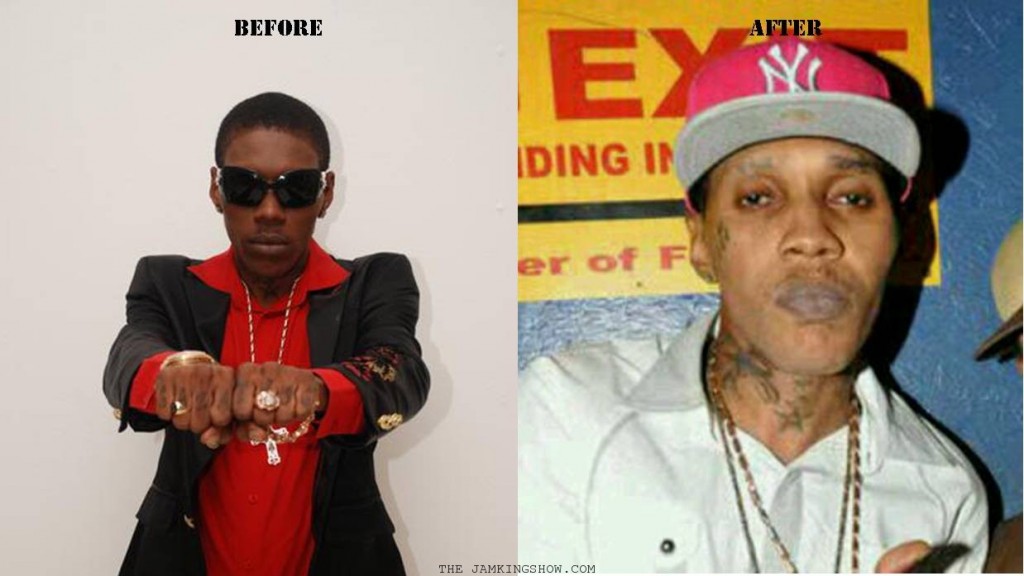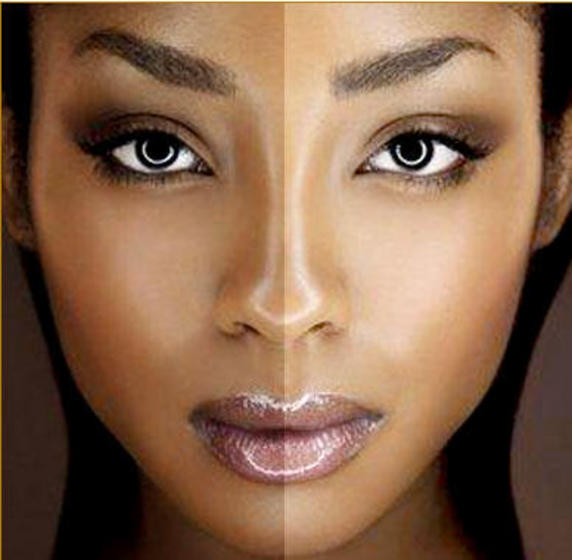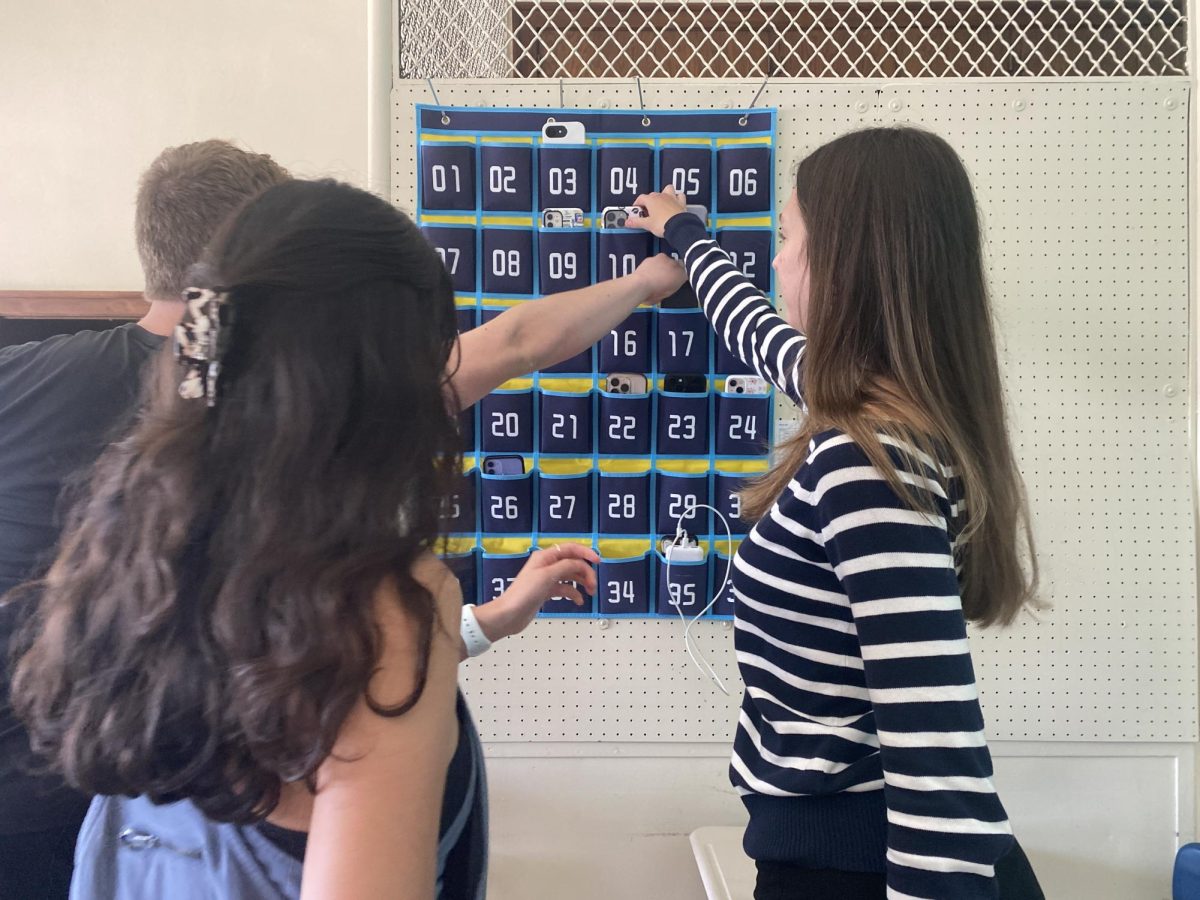 Vybz Kartel before and after his controversial skin color change
Vybz Kartel before and after his controversial skin color change
By Cherrell Anderson
In his early 90s hit, Michael Jackson sang, “It don’t matter if you’re black or white.” Maybe he should have also sung, “It don’t matter if you’re dark skinned or light skinned.” Skin color has not only caused tension between races for years, but also within races, notably with African Americans.
The term “colorism” refers to lighter skin tones being favored and darker skin tones being considered less desirable.
“People look at light skinned people as cleaner and the darker people are seen as ghetto,” said Brandon George, Div. 250, who is dark skinned.
“For light skinned people, [stereotypes] are that they are more mixed, attractive, conceited, self centered, and arrogant. For dark skinned people, they are either ugly or ‘decent,’ and have a good personality,” said Ashley White, Div. 264.
In Hispanic cultures, stereotypes about light skin and dark skin have a lot to do with social status.
Brenda Corona, Div. 251, is from Jalisco, Mexico, where most Mexicans are light skinned and have light colored eyes.
“Jalisco is more developed because it has a lot of main cities. The people there look white, so others assume they have more money and they look at darker Mexicans and think they’re lower-class,” said Corona.
Some students at Lane have been labeled with these stereotypes.
“Freshman year, a lot of dark skinned girls would give me dirty looks and I barely knew them,” said Emily Christmas, Div. 276, who is light skinned and multi-ethnic, consisting of Polish, Czech, Croatian, and African American. “One girl called me fake and said I thought I was better than everyone else because I’m mixed, which is absolutely not true!”
People often learn at an early age that skin tone is an issue in society. White felt less attractive in her dark skin because she was always more attracted to lighter skinned people. White remembered the jokes her own friends would make towards her skin tone.
“If it was nighttime, [my friends] would say something like, ‘Where did Ashley go?’’ White said. “In the summer, when I was a little darker, one of my friends said I looked like I was ‘fresh out of Africa’ and that I’m almost as black as the shirt I’m wearing,” said White. “We insulted each other all the time so it didn’t bother me; I’ve heard it all before so it was just another dark skinned joke.”
When White was younger, she wished that her skin was lighter.
“Years ago, if I could have [changed my skin tone] I would have been light skinned, but not anymore. I learned that my black is beautiful,” White says with a laugh.
Not everyone is as accepting of their skin color as White, and some try to change it. While skin care brands like AMBI (which is targeted towards African American women) and Clinque are used to even skin tones and fade blemishes, freckles, and other dark marks, “skin whiteners” are now being manufactured.
In January of 2011, Jamaican dancehall artist, Vybz Kartel, made headlines when he appeared several shades lighter than his normal dark brown complexion. Kartel claimed to have used cake soap (a clothes-bleaching product) to lighten his skin.
Kartel told Vibe magazine, “When black women stop straightening their hair and wearing wigs and weaves, when white women stop getting lip and butt injections and implants…then I’ll stop using the cake soap and we’ll all live naturally ever after,” in response to the criticism of his new image.
When Blue Power Group, a Jamaican manufacturer of cake soap denied that it could bleach skin, Kartel said he actually used his own concoction which will be available as a men’s line under the Vybz label, according to theybf.com (The Young, Black, and Fabulous).
Among the products in the “Vybz” product line are a skin brightener and body brightening soap. Kartel plans to market his products in the Caribbean first. (Kartel, however, was recently imprisoned in Jamaica after being charged with murder, presumably putting a delay on his plans as a businessman).
The main ingredient for skin lightening creams is hydroquinone, a dangerous chemical and bleaching agent, according to MedicineNet.com. While some people have benefited from using the chemical, using an excessive amount of it, however, resulted in skin peeling, and even turning the skin darker than its original color.
According to the Food and Drug Administration (FDA), “Approximately 65 companies sell over 200 different types of skin-lightening products containing hydroquinone in the U.S.” Hydroquinone is banned in the UK, but its products are popular in Asian and African cosmetic markets.
The cases of skin bleaching further proves that skin color can be a bitter subject.
When Khadijah Lockhart, Div. 370 was growing up, she recalls that the black guys would always go for the light skinned black girls. Lockhart herself is light skinned, and says she received a lot of attention from guys.
“Dark skinned girls would always say that I think ‘I’m all that’ because I’m light skinned and have long hair,” said Lockhart. “It hurt because I felt like they were judging me based on my skin color.”
“I think it’s absurd that my cousin, who is dark, often gets told ‘Wow, you’re pretty for a dark girl,’” said Natalie Frazier, Div. 280.
When it comes to dating light skinned or dark skinned people, some African Americans say they have no preference while others are more particular.
“I do think light skinned people look better than dark skinned people,” said White
“I don’t discriminate, but I love a chocolate boy,” said Monique Paul, Div. 452. “But I’d also date a dark chocolate boy in a heartbeat.”
“I personally am more attracted to light skinned people,” said Diamond Brown, Div. 364. “It doesn’t mean I don’t find darker people attractive; it certainly isn’t prejudice.”
An anonymous light skinned African American male student, stereotyped dark skinned girls as, “easier to pull,” meaning they are more sexually available than light skinned girls. His comment triggered gasps and shocked reactions from both light and dark skinned girls sitting in desks near him.
“From personal experience, more dark skinned girls get sprung on me faster,” said the anonymous student.
Brandon George, Div. 250 added, “Since dark skinned girls usually get less attention, it’s like they’re thirsty for attention sometimes.”
This rivalry between dark and light skinned people is nothing new, tracing some of its roots to the days of slavery. The website for PBS reports on the distinction between the “field slaves” and the “house slaves” in its “Conditions of antebellum slavery” section. The field slaves were more than likely dark skinned blacks and were forced to work outdoors. The house slaves were typically fair skinned blacks, usually descendents from the white slave owners. These slaves were allowed to work in the owner’s home, had access to better food, and were often allowed to have an education.
More evidence of the presence of this prejudice throughout history can be found in music of certain periods. For example, in 1951, African American blues singer, Big Bill Broonzy, sang a song titled, “Black, Brown, and White Blues” about America’s Jim Crow laws. Some of its lyrics include:
“If you is white, you’s alright,
If you’s brown, stick around,
But if you’s black, hmmm, hmmm, brother,
Get back, get back, get back.”
The belief that “the lighter the better” continued long after slavery and Jim Crow. It has shown up in other areas of pop culture.
Film mogul, Spike Lee, made a film in 1988 entitled School Daze based on his experiences at historically black colleges and universities. In one of its most famous scenes, a sorority (consisting of mostly light skinned females, all of whom had long, and/or straightened hair) clashed with other female students, most of whom were dark skinned and wore their hair naturally. Sorority members called the non-affiliated students “jigaboos,” an ethnic slur for black people with stereotypical, black features (dark skin, wide nose, and big lips) and in return, they were referred to as “wanna-bes,” meaning “wanna-be white.”
In the film, Lee also satirizes the “brown paper bag test,” which was commonly used in the early 1900s by African American and Creole fraternities and sororities. These groups would not accept anyone whose skin tone was darker than a paper lunch bag in order to maintain its standards.
The entertainment business seems to encourage the separation between light and dark skinned people, going back to the early years of film when the role of maids were predominately played by dark skinned black women, to present-day movies, television and music.
“You’ll see the more successful person in a movie is light skinned and the darker skinned person is struggling,” said Lockhart.
“The light skinned people are the center of attention [in the media],” said George. “The dark skinned person has to be really good at what they do…at least more talented than the light skinned person.”
On the online blog Rhymes With Snitch a new Tyler Perry movie was being discussed and some accused Perry of continually giving his light skinned actors a positive image and dark skinned actors a negative one. It was noted that in Why Did I Get Married, the darkest main female’s role was loud, ghetto, and violent, while the lighter main female characters were pleasant, soft spoken, and noticeably intelligent.
The same stereotypes persist in the music industry as well.
“I think about the music I listen where ‘red bone’ and light skinned people are mentioned as being sexy and wanted,” said White
Usually in rap and hip-hop songs, light skinned females are sometimes called ‘red bones’ or ‘yellow bones’ and they are referred to as being the most desirable. A few examples are as follows:
“…I’m looking for a yellow bone, long haired star…”- Soulja Boy’s Pretty Boy Swag
“…I like a long haired, thick, redbone…”- Lil Wayne’s Every Girl
“…Beautiful black woman, I bet she looks better red…”-Lil Wayne’s Right Above It
The hip-hop documentary Complexion Obsession discusses the domination of light skinned, exotic women and the lack of dark skinned women in rap videos.
Stereotypes about light skin and dark skin are also present in Hispanic cultures as well.
“In some soap operas, the light skinned characters are nice and the dark skinned characters are evil,” said Catherine Jimenez, Div. 377.
This light skin vs. dark skin battle can be seen on social networking sites such as Facebook and Twitter. Usually made by African American teenagers, groups have appeared on Facebook with names such as “Team Light Skin” and “Team Dark Skin,” and its Twitter equivalent #TeamDarkSkin and #TeamLightSkin.
The Twitter hashtags inspired club promoters in Columbus, OH. These promoters decided to create a party themed around skin tone differences, called the “Light Skin VS. Dark Skin Party.” Both light skinned and dark skinned males and females were to attend and it was held on January 21, a few days after the Martin Luther King Jr. national holiday.
“That’s just ridiculous to me,” said Paul. “I really would like to get five minutes with the idiots who made it.”
“It’s degrading,” Christmas said. “African Americans have come so far from not having rights and struggling just to earn those rights, but instead we choose to have hate among ourselves because one person is lighter than the other. It’s just a waste of everything our ancestors went through to get us equal rights.
The documentary Dark Girls, directed by Bill Duke, explores the biases and attitudes about skin color, particularly toward dark skinned women, outside of and within the Black American culture. In it, women shared their emotional struggles of being dark skinned. One woman said, “I thought [my dark skin] was dirt; I tried to scrub it away, wondering why it wouldn’t come off.” In the film, tears rolled down a woman’s face as she recalled a woman saying she was glad her baby did not turn out dark after she gave birth.
Colorism is not only a controversial issue, but an emotional one that upsets many people, both light skinned and dark skinned. Although this issue may never die, there are still people who look beneath the skin and beyond the spectrum.
“Black people have come too far to continue to demean ourselves with this skin complexion issue. It really angers me,” Frazier said.
“Real beauty isn’t skin deep; it comes from within and shines outwardly,” said Brown. “Real beauty is greater and more complex than skin color, clothes, or shoes. Real beauty is the little light inside of you that shines when everything else around is dark.”





